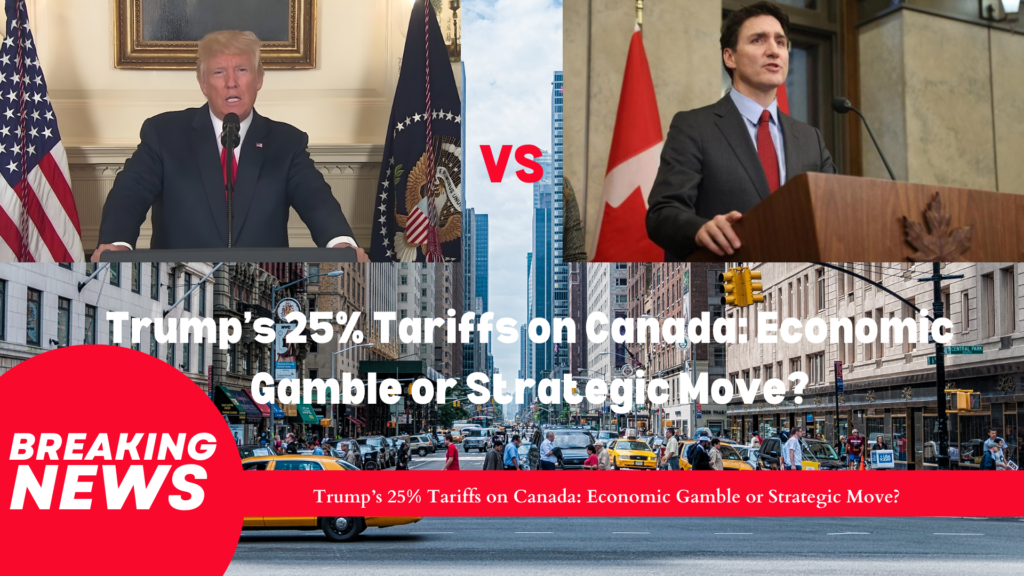On February 1, 2025, President Donald Trump is set to introduce a 25% tariff on imports from Canada and Mexico, a move aimed at boosting U.S. manufacturing and increasing federal revenue. While no definitive decision has been made regarding Chinese imports, ongoing discussions between the U.S. and China suggest that additional trade measures may be forthcoming.
The administration justifies the tariffs as necessary to safeguard American industries, reduce the trade deficit, and address border-related concerns, including illegal immigration and drug trafficking, particularly fentanyl. Officials argue that incentivizing domestic production will enhance national self-sufficiency.
However, economic forecasts indicate potential drawbacks. A recent report from Ernst & Young predicts that if the U.S. implements a 25% tariff on imports from Canada and Mexico, alongside a 10% tariff on Chinese goods, the nation’s GDP could shrink by 1.5% in 2025. Additionally, inflation may rise by 0.4 percentage points, with American consumers likely facing higher prices for essentials such as food and electronics.
Trump says it is “necessary” to impose tariffs on the US’s top trading partners – Mexico, Canada and China – to hold them “accountable to their promises of halting illegal immigration and stopping poisonous fentanyl and other drugs from flowing into our country”.
He says all three countries have a role to play in addressing drug trafficking and illegal immigration in the US and they are not doing enough to stop it – claims that have been strongly refuted by their leaders. He says the administration is “using our leverage to ensure American’s safety”. Tariffs are also central to Trump’s economic vision, who views them as a tool for growing the US economy, protecting jobs and raising tax revenue.
In Canada, political leaders have signaled their intention to retaliate. Chrystia Freeland, a prominent contender to succeed Prime Minister Justin Trudeau, has proposed imposing tariffs on key American products, including Florida citrus fruits, Wisconsin dairy, and dishwashers from Michigan—amounting to $200 billion CAD in targeted goods. This move is designed to impact key U.S. industries and political regions.
Mexico has also announced its readiness to respond with tariffs on American exports, although specific products have yet to be named. Meanwhile, China, although not immediately targeted by the current tariff measures, could reimpose counter-tariffs if future actions by the U.S. affect their trade relationship.
Experts warn that escalating tariff disputes could disrupt supply chains, elevate consumer prices, and strain diplomatic relations with key trading partners. The agricultural sector is particularly vulnerable, with potential losses stemming from diminished export markets and surpluses. Moreover, companies might attempt to bypass tariffs by rerouting goods through non-affected regions or engaging in product mislabeling, potentially undermining government revenue goals.
While the administration maintains that these tariffs are critical for national economic strength and border security, the risk of economic instability and international retaliation could offset the intended benefits.
EU Launches €300,000 Grant to Strengthen Eurocham Nigeria
The European Union (EU) yesterday announced the launch of the Eurocham Nigeria Institutional Development Support program in Lagos. The initiative aims to bolster Eurocham Nigeria’s secretariat, broaden its advocacy efforts, and enhance external engagement for member organizations.
Eurocham Nigeria serves as the umbrella body representing EU chambers of commerce and their partners in Nigeria.
The three-year €300,000 grant underscores the EU’s commitment to helping Eurocham effectively fulfill its mandate while increasing its membership base in Nigeria. The funding will support strategic engagement with government officials, policymakers, and stakeholders to foster a more business-friendly environment.
In addition, the initiative seeks to promote trade and investment between Europe and Nigeria, ultimately benefiting both economies and furthering the EU’s strategic partnership with Nigeria.
During Eurocham’s 25th Annual Stakeholders Conference in Lagos, EU Ambassador to Nigeria and ECOWAS, Gautier Mignot, emphasized the importance of the grant in strengthening Eurocham’s operations and advancing EU-Nigeria trade ties.
He remarked, “A key milestone of 2024 is the approval of a three-year €300,000 grant that we awarded to Eurocham last year. This funding will enable the Chamber to reinforce its administrative capacity and extend its advocacy and external engagement activities on behalf of members.”
Mignot highlighted the EU’s readiness to deepen collaboration with Eurocham Nigeria, pointing to strong governance, effective coordination with EU Member States, and partnerships with bilateral chambers as essential factors for sustained success.
“Building on past achievements sets the stage for expanded opportunities in trade, investment, and infrastructure development,” he added.

